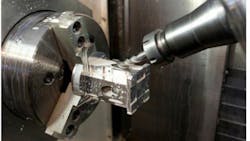Advanced Machining Answers the Call to Do More with Less
In the machining industry today, manufacturers have found themselves in a rather tricky position.
Increased global competition, reduced staff, returning demand and a major skilled-labor shortage have come together in a perfect storm of contrary drivers, forcing manufacturers to use fewer people and fewer resources to create more products of higher quality than ever before.
This classic recipe for dramatic technological innovation is driving machine tool manufacturers to design new, high-speed, multifunction, multi-axis, fully automated machines that promise to drastically increase productivity and fundamentally change the flow of modern plants.
Technology continues to advance very significantly, says Mark Logan, vice president of business development and marketing at MAG -- a global producer of machining tools.
The simple reason is that our customers demand it of us. Our customers are competing in a very dynamic and challenging marketplace. So they always need to be improving to remain competitive.
These advances, says Randy Pearson, dealer support specialist at Siemens Industry Inc., are adding new dimensions to machining capabilities for maximum efficiency and quality.
They use a minimum of five axes, simultaneous for most of their parts, he says. Weve been working with some people who are currently on mill turn-type machines, but now we are getting into seven-axis machining on some turning equipment. The advance to the highly technological machines is moving quite rapidly at this point due to market demands.
Reata Invests in the Way of the Future
I think years ago we reached the stage in this industry where we thought maybe weve done most everything that can be done, says Brian Papke, president of Mazak Corp., another global machine tool producer.
What were really finding is that the ideas for new machines are coming fast, and the rate of innovation as far as machine tools is occurring at a faster stage all the time.
One example of the potential of these machines, he said, can be found at Englewood, Colo.-based Reata Engineering and Machine Works.
Reata, a small shop specializing in medical, aerospace, semi-conductor and high-tech machining, installed its first advanced machining system -- a 5-axis Mazak Integrex i-200S multitasking machine -- after facing a sharp uptick in demand last year.
Prior to this, Reata processed parts on two separate machines, requiring two separate operations on a turning machine and three more on a milling machine for a total of five different setups.
This system created multiple opportunities for error with every time-consuming move, resulting in scrap and accuracy issues all along production and racking up thousands of dollars in waste.
With the new machine, however, this job is completed in a fraction of the time with one setup and one operation that is run largely unattended to eliminate the potential for human error and lessen the stress of the skilled-worker shortage.
I watched the first part come off the machine, recalls Reata CEO Grady Cope. When I picked it up, the first words out of my mouth were, When can we get another one?
The machine runs with minimal operator interaction, requiring 30% less staff time for each part. This means the machine can work night and day without concern for accuracy or errors.
For a job that took two to three weeks in the old system, Cope says, now if we start it on Friday, let it run all weekend, just checking it occasionally, the job will be done by Tuesday at the latest.
The Mazak machine is already processing 20% of sales in the shop, he says. In all, he estimates that it has boosted efficiency and profitability by 200%.
Its been successful beyond what Ive ever expected, he says. Its the way of the future.
About the Author
Travis M. Hessman
Editor-in-Chief
Travis Hessman is the editor-in-chief and senior content director for IndustryWeek and New Equipment Digest. He began his career as an intern at IndustryWeek in 2001 and later served as IW's technology and innovation editor. Today, he combines his experience as an educator, a writer, and a journalist to help address some of the most significant challenges in the manufacturing industry, with a particular focus on leadership, training, and the technologies of smart manufacturing.
